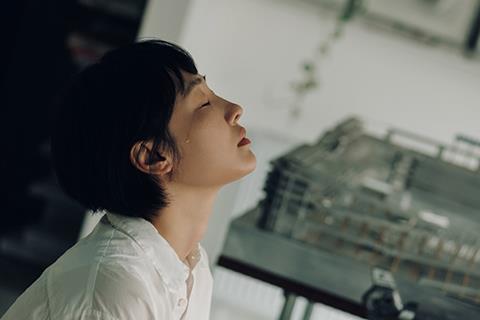The Korean-Chinese director’s follow-up to his Busan-winning ‘Gloaming In Luomu’ features the same cast and crew

Dir: Zhang Lu. China. 2025. 121mins
Is it possible to forget the language of one’s formative years? Do any of us truly lose the ability to communicate in our mother tongue? That’s the question at the heart of Korean-Chinese director Zhang Lu’s languid and rambling Mothertongue, in which a Chengdu-born actor living in Beijing gives up her dreams of movie stardom when a filmmaker hires her for a role to be performed in Chengdu dialect, and then fires her upon discovering she doesn’t speak the language.
Defiantly finds a story in its mundane rhythms and protracted silences
Premiering in competition at Tokyo, the film dispenses with formal narrative structure in favour of a loose, almost improvisational format for its low-key stranger in a strange land observations and exploration of otherness. Ironically economical with its dialogue and reliant on its visuals, Mothertongue defiantly finds a story in its mundane rhythms and protracted silences.
It comes hot on the heels of Zhang’s similarly-themed Gloaming In Luomu, which recently won best film in Busan’s inaugural competition. The films were produced consecutively (although Mothertongue was completed first) and, not only do they share a cast and crew, they make perfect thematic companions, both diving into concepts of alienation, connection, borders and transformation. That should help it attract the attention of festivals and distributors that have a history with Zhang’s work, and the film wouldn’t be out of place for niche distribution in spaces like museums. Speciality streaming platforms should come calling in the future.
Zhang has stated that it was while on holiday in the historic town of Luomu after completing Mothertongue that he was inspired to make a film there, and so he re-recruited the crew for Gloaming. It’s Mothertongue, however, that feels like a thrown together afterthought – though not in a clumsy or unintentional way. Bai Baihe, who played the dancer in search of her missing boyfriend in Gloaming, returns here as Fang Chunshu, a native of Sichuan and graduate of the Beijing Film Academy, still looking for her big break. Failing to live up to a director’s standards for “authenticity” with regard to her Chengdu dialect skills – she understands but can’t speak – she throws in the acting towel and heads home.
Arriving back in Chengdu with her cat, she initially feels like an outsider in her own home, but quickly realises that everyone is a transplant of some type and that she’s surrounded by change. Like Zhang’s previous works Yanagawa (2021), Dooman River (2010) or Grain In Ear (2005), Mothertongue teems with migrants and seekers existing in the margins, and either unsure or unable to connect with those inside them.
Chunshu strikes up awkward relationships with Zhang Mei (also returning from Gloaming and once again the stealth star), her former acting coach, now possibly afflicted with some degree of senility, and Mei’s Shanghai-born son Dong (Wang Chuanjun), who has a tense bond with his mother. Chunshu also has an uneasy reunion with her own single mother, Lijuan (Peng Jin), who speaks entirely in Chengdu dialect and has only fleeting moments for Chunshu between trysts with her new lover.
The vast majority of the story, such as it is, pivots on Chunshu walking the city streets like a tourist and witnessing its transformation, like the re-designation of the Palme d’Or apartment complex (complete with red carpet), slick multi-level building complexes or the abandonment and looming demolition of Chengdu’s storied Emei Film Studio which hosted everything from Lee Sun-fung 1958 Sword of Blood and Valour to Jiang Wen’s Let The Bullets Fly (2010). It’s there she runs into retired filmmaker Du (played by Fifth Generation director Huang Jianxin), who gave Chunshu an small role in one of his films when she was a child, and set her on a path to speaking perfect Putonghua for work at the expense of feeling connected to her roots.
For some viewers the lack of forward momentum or recognisable character arcs will be frustrating. As usual, Zhang is in no hurry to make his point – but that’s also Mothertongue’s distinguishing trait. Stagey, mannered and spoken in half sentences and silences, the film leans into mise-en-scène more than ever to illustrate invisible barriers; a linguistic one. Chunshu’s internalised growth is underscored by cinematographer Piao Songri’s striking compositions, which gracefully suggest where the character is heading with each new space she inhabits.
Production companies: Chengdu Lu Films
International sales: Beijing Monar Films, yiranss88@gmail.com
Producers: Peng Jin
Screenwriter: Zhang Lu, Liu Shuyi
Cinematography: Piao Songri
Production design: Zheng Yican
Editor: Liu Xinzhu
Main cast: Bai Baihe, Wang Chuanjun, Liu Dan, Peng Jin
























